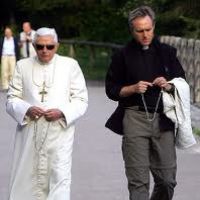It is clear the US Bishops were not big fans of Bush's invasion of Iraq. We can see that here in their 2002 statement. Now I do not wish to argue the merits of that 2002 document. There are many Catholic and Christian bloggers that are doing that in reality right now. I have made tried the case that no matter what your position is on the initial entry of Coalition Forces into Iraq that we are WAY WAY WAY past that point. Debate it if you like as to what lessons should be learned for future policy of the United States. However I find the debate if the war was "just" or to put it exactly the choice to invade Iraq was just or not has little bearing on what to do now as to Iraq.
It appears the US Bishops agree. That is my take in their latest Document on the Iraq War. That is A Call for Bipartisan Cooperation on Responsible Transition in Iraq. Now I take issue with parts of this document. But on the whole it is very responsible. I do think there is a glaring and tragic omission. That is a call to the Catholics in the pews and Catholic Organizations to actively support our fellow Christians in Iraq. Their only statement on this is:
A neglected policy priority is the dire situation of refugees outside the country, internally displaced persons within Iraq, Christians and other vulnerable minorities. The suffering of the Christian community has a particular claim on our hearts and consciences. We remain in solidarity with the suffering Catholic Church in Iraq and welcome with joy the naming of Chaldean Patriarch Emmanuel-Karim Delly of Baghdad to the College of Cardinals by our Holy Father, Pope Benedict XVI.
Perhaps this document is not the place to make such a plea to the faithful. But if not there then where and when? There are other parts of the document that I am not thrilled with. Again much is omission. It would have been helpful if the Bishops would have taken note of some of the progress in Iraq the last few months. The situation on the ground has changed radically in some areas of Iraq since their last statement of January.
The statement is also followed by a interesting Question and Answer section. Now I think its clear that the Bush Administration wants to start a withdrawal from Iraq. In fact the whole Surge that we started seeing earlier this year was based around the FACT that a withdrawal would be happening. The US military and the Bush Administration know that having so much of the US military in Iraq is untenable and in fact presents a long term danger in the ability to respond to other possible global events.
What I find ironic is this. That the conventional wisdom promoted by some many that the Democrats are radically more in line with the US Catholic Bishops than the Bush Administration. I shall quote the Bishops in "LSU" purple and the the Democrats in "Ole Miss" red. My commentary will be in black.
The dangerous political stalemate in Iraq that blocks national reconciliation finds a parallel in our own nation. We are alarmed by the political and partisan stalemate in Washington. Some policy makers seem to fail to recognize sufficiently the reality and failures in Iraq and the imperative for new directions. Others seem to fail to recognize sufficiently the potential human consequences of very rapid withdrawal. These two forms of denial have helped contribute to partisan paralysis.
The Senate was voting Friday on a $50 billion bill that would pay for combat operations in Iraq and Afghanistan about one-fourth of the amount that President Bush has requested but which would also require that troops start coming home. The measure sets a goal of ending combat by Dec. 15, 2008.
The House tonight passed a $50 billion Iraq funding bill that sets a "goal" of having all U.S. forces out of the country by Dec. 2008, the latest move in the ongoing political struggle over the war.
The "Orderly and Responsible Iraq Redeployment Appropriations Act" was adopted by a vote of 218 to 203, with only four Republicans - Reps. Phil English (Pa.), Walter Jones (N.C.), Christopher Shays (Conn.) and James Walsh (N.Y.) - backing the measure.
Now let me suggest that setting that taking a date out of the air of Decemeber 2008 and stating that all US Forces must be out is not responsible. Thought that appears to be a long way off it is not. That is is the very essence of rapid withdrawal. As I posted earlier the withdrawal is happening now as Iraqis themselves can take over security. I do take issue with the Bishops that the political stalemate in Iraq is so bleak. An expert for the Council of Foreign Relations commented on this in very enlightning article. He said in part:
Has there been any sign yet of any effort at high-level or even middle-level reconciliation talks between Shiites and Sunnis?
Lots of talks, but not much legislative progress. If you look at the big five legislative initiatives that we’ve been trying to pursue, for example, none of them has been signed as a law yet. But I think what’s going on, on that front, is quite interesting. Take for example hydrocarbon legislation and de-Baathification, the biggest of the big five. There are no laws passed yet on either one of them, and yet the government is distributing oil revenue to Sunni provinces proportionately to their populations. And the government is hiring Sunnis into the Iraqi security forces.
You get this very bizarre situation in which, even though they won’t pass the laws we’re leaning on them so hard to pass, they’re behaving as though the laws had been passed.
I think this phenomenon of the government behaving as though it has passed laws it refuses to pass warrants a couple more observations. I find this bizarre, so I don’t have a complete answer, but let me spin out a hypothesis as to what might be happening. One hypothesis might be that the Shiite government is still scared to death of the Sunnis and they’re reluctant to legislate iron-clad guarantees for the Sunnis yet. What they want to do instead is kind of dip their toe in the water and do some trial experiments with reconciliation.
For example, they are not willing to mandate that they absolutely must give the Sunnis oil revenue, but maybe they’re willing to try it a little bit as long as they retain the right to withdrawal it if it doesn’t work.
But if it works, maybe they’ll take another step forward. And I think a lot of this again has to do with their change in perception of the U.S. role here. If it looks as though the Americans have stabilized things and are willing to stick around, it becomes safe to engage in these little trials, this toe-dipping phenomenon. So maybe if we allow it to continue, it will blossom into something more.
The Bishops Continue:
Our Conference encourages our national leaders to focus on the morally and politically demanding, but carefully limited goal of fostering a “responsible transition” and withdrawal at the earliest opportunity consistent with that goal. The moral demands of this path begin with addressing the humanitarian crisis in Iraq and minimizing further loss of human life.
Again are we not doing this?
We do not have specific competence in political, economic and military strategies and do not assess particular tactics, but we can, as teachers, share a moral tradition to help inform policy choices. Our Catholic teaching on war and peace offers hard questions, not easy answers. Our nation must now focus more on the ethics of exit than on the ethics of intervention. The grave moral concerns we and others raised prior to the war now give way to new moral questions. In the current situation the traditional principles of “noncombatant immunity” and “probability of success” suggest these questions: How can we minimize the further loss of human lives? What actions will do the most good and least harm? What elements of a responsible transition are attainable? How can theybe achieved? What actions should be avoided? How can decision-makers take into account both the realities and setbacks in Iraq and the likely human consequences of rapid withdrawal? What are the financial costs and global consequences of continued war and occupation? And, how can our nation effectively counter the perversion of religion and ideologies that support terrorism, which in all cases merits condemnation?
I think that sentence is quite welcomed. That is "Our nation must now focus more on the ethics of exit than on the ethics of intervention. The grave moral concerns we and others raised prior to the war now give way to new moral questions".
That has been what I have been screaming. That is the moral questions we face before intervention are now quite frankly not that relevant as to what we do now in Iraq. Yet many Catholic and Christian bloggers and writers continue to say that the the Vatican and the Bishops want our troops out now period. That is a rapid withdrawal. The Bishops here are quite clear that while withdrawal is needed how that happens and at what rate gets far more complex. Are the democrats asking these questions?
The responsibility for stabilizing and rebuilding Iraq rests primarily with Iraqis, but the United States as well as other nations have a practical and moral obligation to act. Given the extensive devastation in Iraq, the U.S. has a unique and inescapable obligation to continue to offer major and continuing support for economic development and reconstruction. Respect for Iraqi self-determination suggests that our nation should reiterate our pledge not to seek permanent military bases in Iraq, nor control over Iraqi oil resources.
Now I think it clear we are not going to be controlling Iraqi resources. In fact the Iraqi people it is becoming clear believe this also. I shall pass over the issues of military bases. It will be up to the IRAQI people to decide if they wish for a continued presence of the US military. To be honest I don't see that occurring unless it is a long term presence in sufficient numbers on the Iranian/Iraq borders to deter Iranian ambitions in the region. Or something akin to a peacekeeping force in Kurdistan where relations with Turkey are to say the least explosive.
My only major complaint , besides the fact that the Bishops seem to the ignoring real progress on the ground, is the continued use of the word "occupation" ,At what point is it not a Occupation? For instance are we still occupying Germany? Now of course US bases in 21 century Germany is quite different than Iraq. Still it appears that the elected Iraq Govt wants us there. More to the point so do the locals. AJ reported a few days ago on a major event that happened in Vermont. Go see Anbar Awakening Shiek Comes To America To Give Thanks.
An important sheik from an Iraqi province had a reunion on Thursday with some Vermont soldiers at the state National Guard headquarters.
(Abu Risha) (voice in Arabic, then translator) “We would like to express our appreciation to the National Guard and to the state of Vermont.'’
(Host) Sheik Ahmed Abu Risha spoke through a translator. He said his province has overcome terrorists and insurgents.
(Abu Risha) (voices shift back and forth from Arabic to English) “Today in this state … we present this victory … to the families of the victims of the soldiers in Iraq … and specifically express our appreciation to the state of Vermont.'’
(Host) He was one of three officials from the Al Anbar province who visited the US.
Again the ethics of withdrawal.
In the question and answer section:
2. What does USCCB mean by a “responsible transition?”“Responsible transition” is a morally and politically demanding, but carefully limited goal that allows for a responsible withdrawal at the earliest opportunity. The moral demands of this transition begin with minimizing further loss of human life and addressing the humanitarian crisis in Iraq, the refugee crisis in the region, and human rights, especially religious freedom.Each course of action in Iraq should be weighed in light of the traditional moral principle of “probability of success,” i.e. the likelihood that the action will contribute to a “responsible transition” and withdrawal as soon as appropriate and possible.
I think that is significant. That is the Bishops talking about "probability of succcess". I will say that Catholics and Christians that oppose much of the current policy in Iraq largely shy away from talking about the real success we are seeing period. They have a ways to go to change their mindset into thinking about "probabilty of success" IMHO. I hope to se it.
An interesting document to say the least. In the end it does not endorse the Bush Policy or the Democrat policy. However it is pressing those that have opposed thios intervention from the start to think differently as to the moral questions we are facing. I think that is important
Friday, November 16, 2007
Are the Democrats in Line With the US Bishops on Iraq?
Posted by
James H
at
11/16/2007 12:51:00 PM
![]()
Labels: Bush, Catholic, Catholic Politics, catholic social justice, democrats, GOP, Iraq, Islam, United State Catholics, WOT
Subscribe to:
Post Comments (Atom)














No comments:
Post a Comment